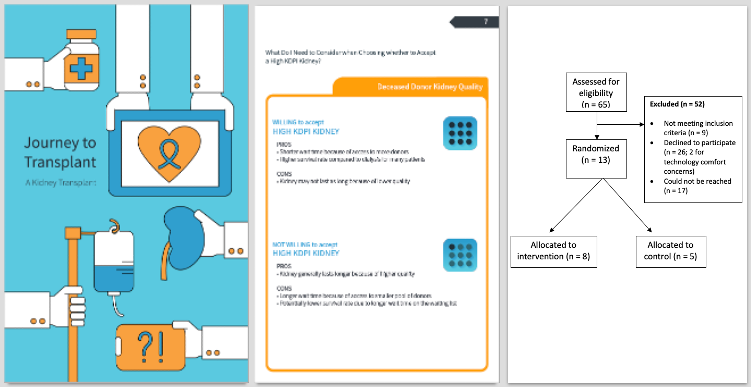Journey to Transplant: A Pilot Feasibility Trial of a Virtual Counseling Intervention for Patients and Their Social Support Networks to Improve Access to Kidney Transplant
A. Hart1, R. Edpuganti2, H. D'Cunha2, S. Kurschner2, W. T. McKinney1, A. Matas1, R. Patzer1, S. Chu1, M. Bruin1, M. Partin1
1Hennepin Healthcare, University of Minnesota, Minneaplis, MN, 2Hennepin Healthcare Research Institute, Minneaplis, MN
Meeting: 2021 American Transplant Congress
Abstract number: 327
Keywords: Kidney transplantation, Psychosocial, Waiting lists
Topic: Clinical Science » Kidney » Kidney Psychosocial
Session Information
Session Name: Kidney Psychosocial
Session Type: Rapid Fire Oral Abstract
Date: Tuesday, June 8, 2021
Session Time: 4:30pm-5:30pm
 Presentation Time: 4:40pm-4:45pm
Presentation Time: 4:40pm-4:45pm
Location: Virtual
*Purpose: Home counseling interventions have shown promise in increasing rates of kidney transplant, but are challenging to implement. We piloted a structured but individualized virtual counseling intervention, including a risk calculator for outcomes on the waitlist, for a candidate with their social support network (SSN).
*Methods: Transplant candidates, defined as patients moving beyond the initial evaluation, were recruited from 2 centers in Minneapolis. The study was informed by a patient and family advisory committee comprised of 12 kidney transplant candidates, recent recipients, and family members. The 1.5-hour virtual counseling session was designed using Intervention Mapping to incorporate focus group data on patient and SSN needs into an intervention grounded in behavior change theory. The intervention was conducted by a nephrologist and consists of 3 parts: 1) standardized education about transplant options, pros and cons, 2) review of the patient’s calculated likely outcomes on the deceased donor waitlist, and 3) addressing barriers and needs specific to that patient.
*Results: 8 kidney transplant candidates, along with 19 (1-4 each) of their SSN members, were randomized to the intervention, and 5 candidates to controls. Half of social support network members reported getting all their information from the patient. Both patients and SSN members had knowledge gaps prior to the intervention; e.g. 67% of patients and 57% of SSN members did not know that living donor kidneys usually last longer than deceased donor kidneys. After the intervention, participants reported having a better understanding of options such as increased infectious risk kidneys in light of likely outcomes on the list, and felt more empowered. The outcomes calculator was emotional but well-received by SSN members in particular. SSN members reported better understanding their patient’s disease and how to help the patient get transplanted. Participants gave useful feedback on how to improve the intervention.
*Conclusions: A virtual group counseling session with patients along with their SSN is feasible in different transplant center settings and well-received by patients and SSN members. Recruitment will begin at a third center in Atlanta, GA to further assess implementation barriers. A future randomized controlled trial will determine whether the intervention increases rates of kidney transplant.
To cite this abstract in AMA style:
Hart A, Edpuganti R, D'Cunha H, Kurschner S, McKinney WT, Matas A, Patzer R, Chu S, Bruin M, Partin M. Journey to Transplant: A Pilot Feasibility Trial of a Virtual Counseling Intervention for Patients and Their Social Support Networks to Improve Access to Kidney Transplant [abstract]. Am J Transplant. 2021; 21 (suppl 3). https://atcmeetingabstracts.com/abstract/journey-to-transplant-a-pilot-feasibility-trial-of-a-virtual-counseling-intervention-for-patients-and-their-social-support-networks-to-improve-access-to-kidney-transplant/. Accessed March 3, 2026.« Back to 2021 American Transplant Congress

